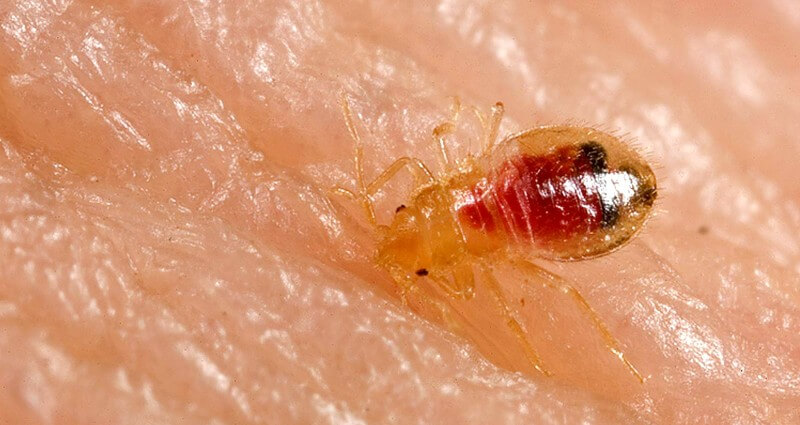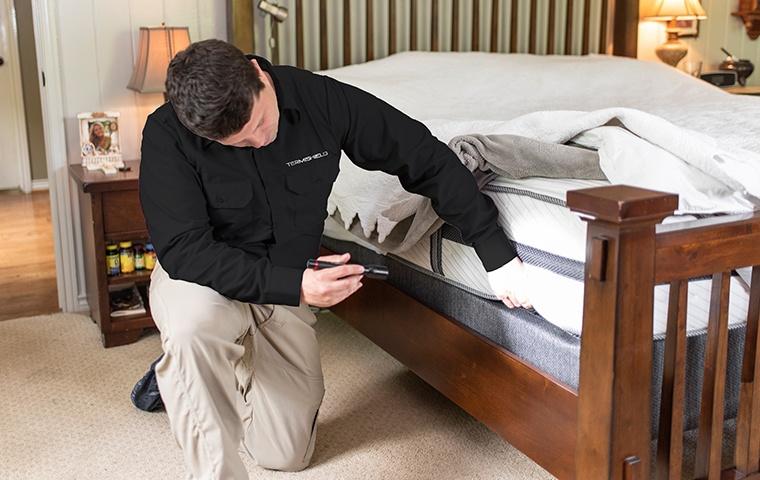Finest Kings Pest Control Cincinnati: Top-Rated Exterminators
Finest Kings Pest Control Cincinnati: Top-Rated Exterminators
Blog Article
A Break Down of the Different Types of Parasite Control Solutions
In the world of bug control, a multitude of methods exist to fight the visibility and address of undesirable creatures. From the standard use chemical pesticides to more innovative organic control solutions, each strategy provides distinct advantages and restrictions. As we browse with the varied landscape of bug control remedies, comprehending the complexities of each method becomes critical in establishing the most reliable strategy. Stay tuned as we check out the nuanced world of bug control techniques and uncover just how each kind plays an one-of-a-kind role in securing our atmospheres.
Chemical Pesticides
Chemical chemicals are typically used in insect control to efficiently eliminate a large range of bugs and other insects. These pesticides work by targeting the anxious system of the bugs, disrupting their typical features, and inevitably resulting in their demise. Making use of chemical pesticides has been a staple in the parasite control sector for decades as a result of their performance and fast outcomes.

However, it is necessary to use chemical pesticides with care as a result of their possible hazardous impacts on the setting and non-target types. Inappropriate application or overuse of these pesticides can bring about pollution, harm to useful insects, and resistance development in parasite populations. It is essential to adhere to safety standards and laws when using chemical pesticides for insect control.
Biological Control Techniques
Considering the potential ecological effects and risks related to chemical pesticides, organic control methods use a more lasting method to managing parasite populaces. Biological control includes using all-natural adversaries, such as microorganisms, predators, and bloodsuckers, to subdue parasite populations. This technique is frequently more targeted, affecting only the particular parasite species while minimizing injury to useful pests, people, and the setting.

One benefit of biological control is its long-lasting performance. As soon as established, all-natural adversaries can help regulate pest populaces continually without the demand for repeated applications of pesticides. Additionally, organic control is commonly much more cost-effective and can help in reducing pesticide resistance in bug populations over time. Generally, biological control methods supply a eco friendly and lasting option to pest administration.

Mechanical Parasite Control
Mechanical bug control entails the physical control or removal of pests to handle their populaces effectively. This method is typically employed along with other bug control strategies for thorough insect monitoring. One typical instance of mechanical bug control is utilizing catches to capture insects or rats. These catches can be established up in strategic locations where pests are understood to dwell, aiding his comment is here to reduce their numbers.
An additional mechanical approach is the use of barriers such as webs, screens, or fences to block pests from going into details areas. By literally preventing parasites from accessing a place, the chance of problems or damages can be considerably lowered. Furthermore, manual approaches like handpicking bugs off plants or structures can be reliable for smaller-scale infestations.
While mechanical bug control approaches can be labor-intensive, they use a non-chemical choice that can be sustainable and eco pleasant. By targeting bugs directly, mechanical control strategies can aid keep parasite populations in check without depending on pesticides.
Natural Remedies
Making use of all-natural solutions for pest control supplies a environmentally friendly and sustainable strategy to taking care of bug populations without resorting to chemical treatments. All-natural blog solutions include making use of compounds originated from plants, minerals, or other normally taking place sources to prevent or eliminate parasites. As an example, sites growing specific herbs like basil, mint, or lavender around your residential or commercial property can ward off insects as a result of their strong aromas. Diatomaceous earth, a powder made from fossilized algae, can be used to fight pests like ants, roaches, and bed insects by dehydrating their exoskeletons.
In addition, essential oils such as tea tree oil or neem oil have insecticidal residential or commercial properties that can effectively regulate pests while being risk-free for the setting. Another natural solution is introducing useful insects like ladybugs or hoping mantises to your yard to exploit hazardous bugs. By including these all-natural solutions right into parasite monitoring techniques, people can reduce their reliance on artificial chemicals and advertise a healthier, a lot more balanced ecosystem.
Integrated Parasite Monitoring
Integrated Bug Administration (IPM) is a thorough technique that combines numerous methods to efficiently regulate pest populations while minimizing dangers to human health and wellness and the atmosphere. IPM entails the combination of numerous pest control techniques such as organic control, habitat manipulation, alteration of social techniques, and the usage of immune plant ranges. By using a mix of these strategies, IPM aims to minimize reliance on chemical pesticides, which can have adverse influence on ecosystems and human health and wellness.
One secret facet of IPM is the emphasis on avoidance. By applying procedures to stop pest invasions prior to they take place, such as keeping proper cleanliness and sealing entry factors, the demand for responsive pest control procedures is reduced. Surveillance and regular evaluations play a vital role in IPM, enabling for early detection of parasite issues and punctual intervention.
Verdict
To conclude, the different sorts of parasite control options use a series of alternatives for effectively taking care of parasite infestations. Chemical chemicals supply fast obliteration yet may have ecological threats. Organic control approaches use all-natural predators to control pests. Mechanical bug control involves physical barriers or catches. Natural treatments offer non-toxic alternatives. Integrated Pest Management combines several approaches for a holistic approach to pest control. Each method has its own benefits and drawbacks, and selecting the most ideal option depends on the specific insect issue at hand.
Chemical pesticides are typically used in parasite control to successfully remove a vast array of insects and various other bugs.Mechanical insect control entails the physical adjustment or removal of insects to manage their populations effectively (Kings pest control Cincinnati Ohio).Using all-natural remedies for parasite control offers a sustainable and green method to handling bug populations without resorting to chemical treatments.Integrated Insect Monitoring (IPM) is a thorough strategy that combines different strategies to properly control pest populations while decreasing dangers to human health and wellness and the setting.In final thought, the numerous types of pest control options provide a range of options for effectively managing pest invasions
Report this page